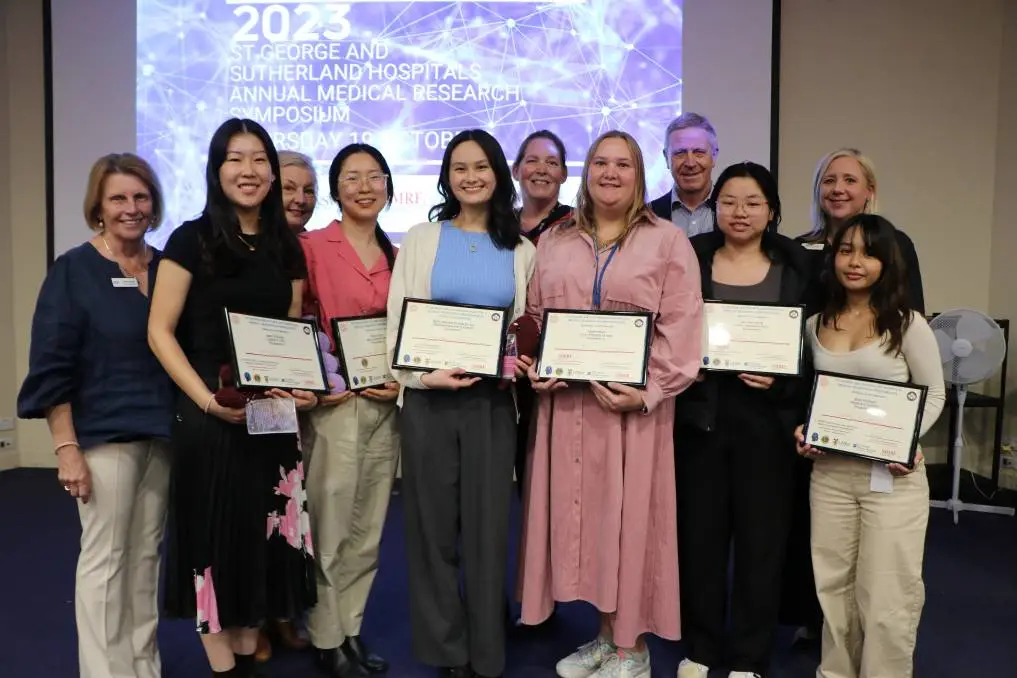Introduction
In the heart of Sydney, against the stunning backdrop of its iconic harbor, the South Eastern Sydney Local Health District hosted its annual research event, aptly named Sydney’s Symposium. This remarkable gathering brought together brilliant minds, fostering discussions on some of the most profound health mysteries of our time.
The symposium shone a spotlight on the groundbreaking work of early-career scientists from the St George and Sutherland Medical Research Foundation (SSMRF). In this blog post, we’ll dive into the highlights of this year’s symposium and explore how it is transforming the landscape of healthcare research and patient care.
Sydney’s Symposium: Unveiling the Gut Microbiome’s Role in IBD

At this year Sydney’s Symposium, the focus was on the intricate study of microbiome changes linked to inflammatory bowel disease (IBD). Researchers unveiled groundbreaking findings that highlighted the pivotal role of shifts in the gut microbiome in the development and progression of IBD. In simple terms, the gut microbiome is a complex community of microorganisms that reside in our digestive tract. Understanding how it influences our health is crucial.
One of the most significant revelations was the profound impact of external environmental factors on our gut flora. These factors include diet, stress, and exposure to toxins. The Sydney’s Symposium explored the fascinating interplay between these elements and the composition of the gut microbiome. This research emphasizes the importance of considering the environment when addressing IBD, opening new avenues for prevention and treatment.
Patient Ownership in Healthcare
A resounding theme throughout the symposium was the concept of patients “owning their own space” in healthcare. This revolutionary idea empowers patients to actively participate in their health journey. It’s a paradigm shift that’s changing the dynamics of healthcare delivery. This new approach puts patients at the center of their care, making them partners in decisions about their health.
Precision Medicine: Tailoring Treatment to Individuals
The symposium places significant emphasis on precision medicine, which represents a medical research approach tailored to the distinctive characteristics of each patient. It leverages genomic and other molecular information to formulate personalized treatment strategies. The overarching objective is to craft therapies customized to individual patients by deciphering their genetic and molecular profiles. This approach represents a substantial advancement in healthcare, offering the potential for more efficient and precisely targeted treatments.
The Role of External Environmental Factors
The Sydney’s Symposium shed light on how external environmental factors play a crucial role in molding the gut microbiome and impacting Inflammatory Bowel Disease (IBD). Researchers have found that what we eat, how we manage stress, and our exposure to toxins can significantly impact our gut health. Understanding these factors is essential for developing comprehensive treatment and prevention strategies.
Collaboration and Knowledge Sharing
The symposium was a place where young researchers could share their work and learn from experienced experts in the field. It emphasized the significance of unraveling the intricate interplay between the gut microbiome, genetic factors, and environmental influences in the genesis of IBD. This collaborative environment fosters innovation and drives progress in the field of healthcare.
Sydney’s Health Events
Sydney was a hub for healthcare events, with the symposium being just one of them. The WONCA World Conference 2023 gathered general practitioners, family doctors, and primary health practitioners worldwide, focusing on addiction medicine, COVID-19, mental health, and women’s health. Simultaneously, the St Vincent’s Hospital 30th National Hepatitis Symposium delved into the latest advancements in diagnosing and treating hepatitis B, C, and D, highlighting the importance of addressing hepatitis in prison settings, where its prevalence is often higher than in the general population.
In summary, these events underscored the power of research, collaboration, and patient-centered care in tackling crucial health issues. They shed light on the complex interplay between genetics, environment, and disease, offering the potential for personalized healthcare approaches. Most importantly, they stressed the need to empower patients, making them active participants in their healthcare journey rather than passive recipients.
Conclusion
Sydney’s symposium research was not just a gathering of brilliant minds; it was a testament to the power of research, innovation, and collaboration. The insights gained from the Sydney’s Symposium are poised to reshape the way we approach healthcare, with a focus on the microbiome, precision medicine, and patient-centric care.
This marks a significant step towards a future where healthcare is not one-size-fits-all but tailored to each individual’s unique needs. It’s a future where patients have an active role in their health journey, driving positive changes in healthcare delivery. Sydney’s symposium has left an indelible mark on the landscape of healthcare research and innovation.
Stay tuned for more exciting stories and subscribe to the USA Mirror newsletter to stay updated.
Thank you so much for reading. We appreciate you valuable time
Frequently Asked Question (FAQ)
What is Sydney's Symposium medical research?
Sydney's Symposium is a series of annual medical research symposia held in Sydney, Australia. The symposia are organized by the Sydney Medical School and bring together leading researchers from around the world to discuss the latest advances in medical research.
What are the main areas of research covered by Sydney's Symposium?
Sydney's Symposium covers a wide range of medical research topics, including cancer, cardiovascular disease, infectious diseases, neurodegenerative diseases, and mental health.
Who are the speakers at Sydney's Symposium?
The speakers at Sydney's Symposium are world-renowned experts in their respective fields. They are typically senior academics, clinicians, and industry leaders.
How can I attend Sydney's Symposium?
Sydney's Symposium is open to the public, but registration is required. Registration fees vary depending on the type of attendee.
What are the benefits of attending Sydney's Symposium?
Attending Sydney's Symposium is a great way to learn about the latest advances in medical research and to network with leading researchers from around the world. The symposium is also a valuable opportunity for students and early-career researchers to learn about potential career paths and to meet potential mentors.




